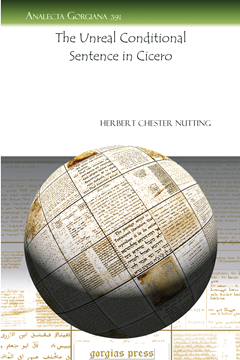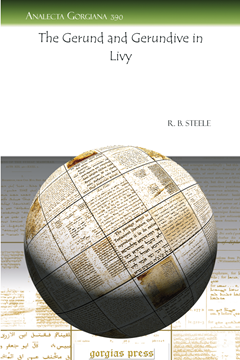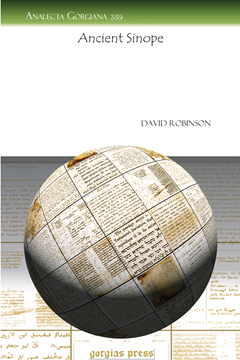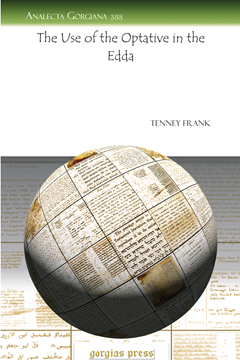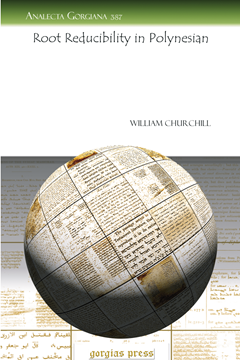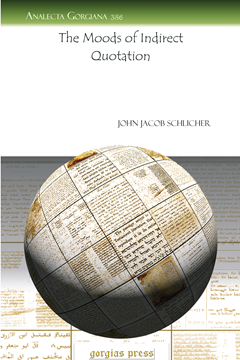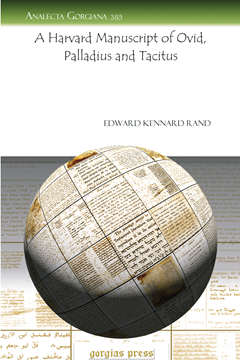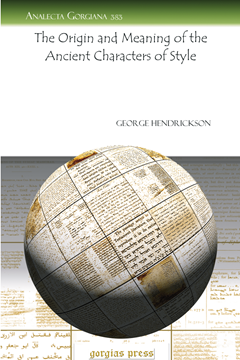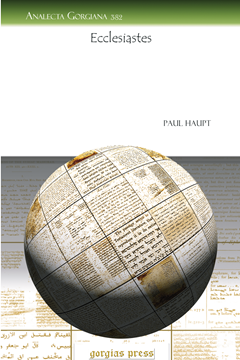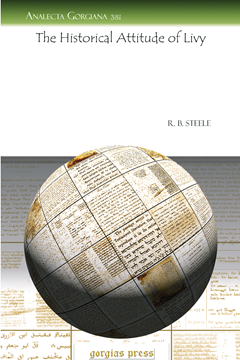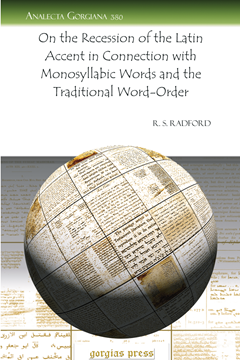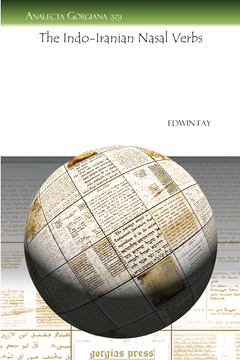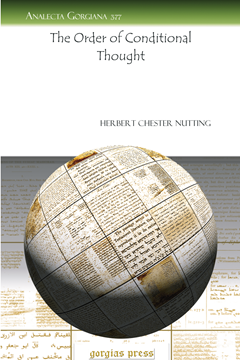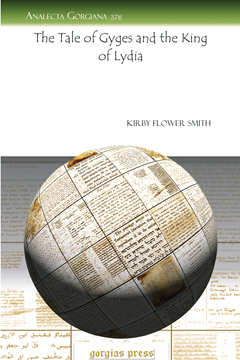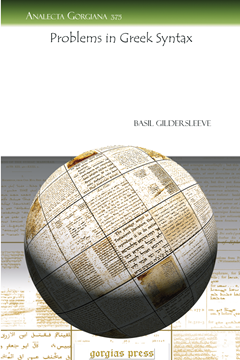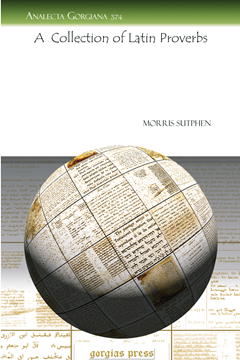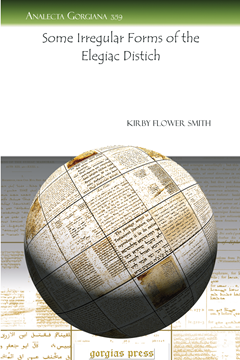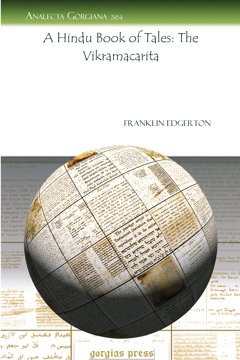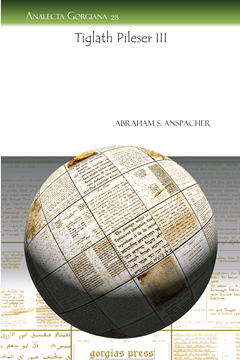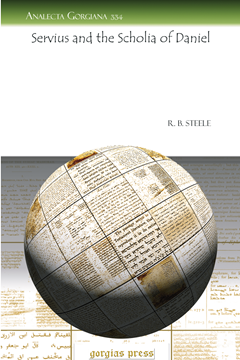Analecta Gorgiana
Analecta Gorgiana is a collection of long essays and short monographs which are consistently cited by modern scholars but previously difficult to find because of their original appearance in obscure publications. Carefully selected by a team of scholars based on their relevance to modern scholarship, these essays can now be fully utilized by scholars and proudly owned by libraries.
The Unreal Conditional Sentence in Cicero
Series: Analecta Gorgiana 391
ISBN: 978-1-60724-640-4
H. C. Nutting's exploration of the use and structure of conditional sentences in Cicero's prose provides a clear discussion of this key feature of Latin syntax.
$38.00 (USD)
The Gerund and Gerundive in Livy
By R. B. Steele
Series: Analecta Gorgiana 390
ISBN: 978-1-60724-639-8
R. B. Steele classifies Livy's use of the gerund and gerundive in his history of Rome, providing insight into the regular useage of this rather irregular feature of Latin grammar.
$35.00 (USD)
Ancient Sinope
Series: Analecta Gorgiana 389
ISBN: 978-1-60724-638-1
David Robinson, excavator of Olynthos, here gives an account of the site and history of Sinope, a trading city on the Black Sea.
$45.00 (USD)
The Use of the Optative in the Edda
By Tenney Frank
Series: Analecta Gorgiana 388
ISBN: 978-1-60724-637-4
Tenney Frank's review and discussion of the uses of the optative in the Edda sagas of Iceland.
$37.00 (USD)
Root Reducibility in Polynesian
Series: Analecta Gorgiana 387
ISBN: 978-1-60724-636-7
William Churchill's essay on roots in Polynesian language, challenging the Euro-centric scholarship of traditional linguistics.
$37.00 (USD)
The Moods of Indirect Quotation
Series: Analecta Gorgiana 386
ISBN: 978-1-60724-635-0
A discussion of the psycology behind tense and mood choice in Latin indirect speech.
$36.00 (USD)
A Harvard Manuscript of Ovid, Palladius and Tacitus
Series: Analecta Gorgiana 385
ISBN: 978-1-60724-634-3
Edward Rand's analysis of the Harvard ms. L25, one of the few sources for both Ovid's Heroides and Tacitus' Germania.
$39.00 (USD)
The Vatican Codex of Cicero's Verrines
Series: Analecta Gorgiana 384
ISBN: 978-1-60724-633-6
Sir Peterson's analysis of the Vatican codex of Cicero's Verrine Orations.
$36.00 (USD)
The Origin and Meaning of the Ancient Characters of Style
Series: Analecta Gorgiana 383
ISBN: 978-1-60724-632-9
Prof. Hendrickson traces the legacy of Greek rhetorical theory in the writings of Cicero.
$39.00 (USD)
Ecclesiastes
By Paul Haupt
Series: Analecta Gorgiana 382
ISBN: 978-1-60724-631-2
Paul Haupt's introduction, translation, and commentary on the controversial book of Ecclesiastes in the Hebrew Bible.
$40.00 (USD)
The Historical Attitude of Livy
By R. B. Steele
Series: Analecta Gorgiana 381
ISBN: 978-1-60724-630-5
R.B. Steele provides an analysis of Livy's philosophy on the methology and purpose of the writing of history.
$36.00 (USD)
On the Recession of the Latin Accent in Connection with Monosyllabic Words and the Traditional Word-
Series: Analecta Gorgiana 380
ISBN: 978-1-60724-629-9
Prof. Radford uses early Latin poetry to examine patterns of vowel quantity in early spoken Latin.
$43.00 (USD)
The Indo-Iranian Nasal Verbs
By Edwin Fay
Series: Analecta Gorgiana 379
ISBN: 978-1-60724-628-2
Edwin Fay's mathematical model for the patterns of mutations in nasal Sanskrit verbs.
$50.00 (USD)
The Imperfect Indicative in Early Latin
Series: Analecta Gorgiana 378
ISBN: 978-1-60724-627-5
Prof. Wheeler traces the development of the Latin imperfect from its earliest roots to its later simplification.
$36.00 (USD)
The Order of Conditional Thought
Series: Analecta Gorgiana 377
ISBN: 978-1-60724-626-8
Prof. Nutting surveys and explains the psycological reasoning behind the conditional sentence, providing context for the often confusing grammatical constructions they present.
$42.00 (USD)
The Tale of Gyges and the King of Lydia
Series: Analecta Gorgiana 376
ISBN: 978-1-60724-625-1
Kirby Smith explores varying 5th and 4th century BC accounts of the life and demise of Gyges, best known from Herodotous' History.
$41.00 (USD)
Problems in Greek Syntax
Series: Analecta Gorgiana 375
ISBN: 978-1-60724-624-4
Basil Gildersleeve discusses certain difficulties in codifying Greek syntax.
$36.00 (USD)
A Collection of Latin Proverbs
Series: Analecta Gorgiana 374
ISBN: 978-1-60724-623-7
Sutphen's list of Latin proverbs from the Classical era through the Middle Ages, arranged aphabetically.
$55.00 (USD)
Some Irregular Forms of the Elegiac Distich
Series: Analecta Gorgiana 359
ISBN: 978-1-60724-622-0
Kirby Flower Smith explores the development of Greek and Latin elegiac meter from its origins to Imperial Rome.
$36.00 (USD)
Yours, Mine, or Theirs? Historical Observations on the Use, Collection and Sharing of Manuscripts in
Series: Analecta Gorgiana 126
ISBN: 978-1-60724-059-4
In the west centuries ago manuscripts were replaced by printed books, and relegated to mostly secular libraries as a result of religious and political upheavals. In the Christian Orient such changes were slower and remain less advanced. Manuscripts have not entirely vanished from regular use, and Christian communities retain ownership of significant collections of their historic manuscripts. The vital connection between manuscripts and religious culture endures, even if attenuated by persecution, diaspora, technology, and other aspects of modernity. This essay provides an historical survey of these issues in both Europe and the Christian Orient (limited here to the Middle East, the Caucasus, and Ethiopia/Eritrea).
$36.00 (USD)
Recognition Scenes in Greek Literature
Series: Analecta Gorgiana 396
ISBN: 978-1-60724-645-9
Prof. Perrin uses Aristotle's Poetics to classify and analyze the various sorts of recognition scenes found in surviving Greek literature.
$37.00 (USD)
A Hindu Book of Tales
The Vikramacarita
Series: Analecta Gorgiana 364
ISBN: 978-1-60724-651-0
This is the introduction to Edgerton's edition and translation of the Vikramacarita, a Sanskrit story-collection.
$38.00 (USD)
Tiglath Pileser III
Series: Analecta Gorgiana 28
ISBN: 978-1-59333-598-4
The historic first attempt to provide a succinct account of the reign of the founder of the Neo-Assyrian Empire, Anspacher’s monograph has stood the test of time. Written in accessible form, this brief account of a king, notorious by biblical standards, will be welcomed by all who are interested in the history of the Middle East.
$49.00 (USD)
Servius and the Scholia of Daniel
By R. B. Steele
Series: Analecta Gorgiana 334
ISBN: 978-1-60724-616-9
Steele suggests a division in the longer edition of Servius' commentary on Vergil between Servius and the work of later commentators.
$40.00 (USD)
Semasiological Possibilities
By Francis Wood
Series: Analecta Gorgiana 333
ISBN: 978-1-60724-615-2
Francis Wood, a linguist known for his work on Latin and Greek etymology, here presents the thesis “Difference in meaning is of itself no bar to connecting words.”
$38.00 (USD)

